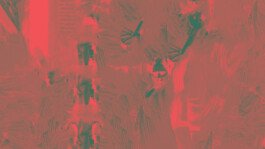
By Christiane Waked
I signed up not knowing what to expect. All I knew was that flamenco music had lit some fire in me at a time there was no fire left in my heart.
I was healing from cancer and going through a tough divorce. Both experiences had drained me to the core. In class, as I followed the teacher’s instructions, learning how to make the rhythm by stamping the feet, my eyes remained fixed to the ground.
I still remember my teacher, in her charming Spanish accent, telling me: “La cabeza alta!” (“Keep your head high!”). It felt less like a formal instruction and more a reminder to restore my broken pride. I tried hard to hold back my tears but they betrayed me and I sighed heavily, feeling my cheeks get wet. She repeated the phrase, looked me in the eye and added: “You want to heal? Then trabaja – work!”
This toughness and discipline required me to dig deep. The strength I put into kicking the floor, making music out of my body, the sweat that dripped from my skin – slowly these things were reconnecting me with my feelings.
They say that trauma cuts us off from our own sensations, our emotions. But when I danced Solea, a flamenco musical form described by professionals as the “serious flamenco”, I felt despair as it conveys the most intimate feelings of pain. In contrast there was the Alegrias, which reconnected me with a self that had been numbed by illness. Every time I heard the Tirititran, the opening of an Alegrias, I could feel the lightness of its joy in my heart.
After I got my kidney removed because of cancer, I gained around 30 kilos. I had several complications from my first operation and I had to go through another procedure, which triggered a profound depression. I started to fill the void that the fear of dying created in me with food. My self-esteem had vanished, my ego was bruised and I kept blaming myself to a point I became my own victim.
I always had a certain dislike for people who play the victim. Life though has humbled me to be less judgmental. When you face major traumas in life, you risk entering a state of deep denial. You can get stuck because you stop asking yourself the right questions, such as, Did I get married right after cancer to trick death? Was this marriage some sort of safety net instead of a real and healthy relationship? Am I comfortable with blaming cancer for my eating disorder?
My teacher was an intelligent woman. She found her own way through to me and started to explain that flamenco, like the gypsies that created it, was always on the move. It was her way to push me to move on from my past and to be present in the moment. She kept telling me: “Listen to the sound of your feet, grab that sound and own it.”
Over time, she also gave me a cultural canvass, showing me pictures and videos of flamenco dancers. To my delight I discovered they are not your typical thin and fit bodies we tend to visualize dancers to be. Some were fat, short, some were beautiful or not so beautiful, young, middle-aged and even very old. I learnt flamenco does not discriminate. Instead, it highlights each person’s uniqueness.
Ever since I was a kid, I have resented anything that struck me as fake. I resented a girl who copied me in every way as it felt like she was stealing my identity. I realized later that the lost girl was not the problem, she was only a shadow of my own insecurities.
With flamenco, I started to feel more secure again. The dance made me feel beautiful in my shape and at home in my own person. In flamenco, no one can steal your moment. My body spoke its own language and no one could take that away from me.
By creating and orchestrating the beat with my feet and the movements of my hands, it felt like I gained something else: control over my body and, in turn, felt more in control of my life. I got to know the flamenco vocabulary, the singers, the styles, all I needed to know. It became my obsession, an addiction even. I would spend hours translating the lyrics or coplas, finding resonance with chapters of my own life. There were no borders. I lived in Abu Dhabi but my ears, body and heart were somewhere in Andalusia.
For seven years, all I could think of was flamenco until one day, I realized it was out of my system. The healing was done. Time to move on.
I still, of course, listen to the music or watch an occasional film, but more as a casual observer. It is as if I was someone else back then. Indeed, I am a different person, less bruised, messed up and lost. But it is Flamenco I have to thank for rooting my feet. I do not feel like running away to Andalusia anymore, I am fine where I am – at home in my own heart.
Christiane Waked works as a political and risk analyst, columnist for the Khaleej Times and an arts and culture contributor. Christiane is the former Press Attaché of the French Embassy to the UAE and has worked as a linguist and analyst in the French Interior Ministry.